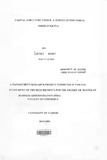| dc.contributor.author | Musili, Kioko | |
| dc.date.accessioned | 2013-05-15T09:39:39Z | |
| dc.date.available | 2013-05-15T09:39:39Z | |
| dc.date.issued | 2005 | |
| dc.identifier.uri | http://erepository.uonbi.ac.ke:8080/xmlui/handle/123456789/23091 | |
| dc.description.abstract | If it is difficult for a firm to measure impact on the value of the firm under different levels of
leverage, it should not be surprising that managers are not very concerned about maintaining
an exact capital structure.
The judgment required to make sound financing decisions implies that managers balance the
need to avoid dilution against (for example) the need to grow and maintain financial
flexibility. This study sought to find out the factors that motivate management of industrial
firms in Kenya in choosing their capital structure.
The findings revealed that managers do avoid issuing under- valued securities by financing
first with internal equity and then with external claims that are least likely to be mis-priced.
Internal equity is the most preferred source, external equity is the least and straight and
convertible debts are in the middle.
The pecking order theory seems more predictive of how financing decisions are made in
practice. More descriptive still, however, are the conventional financial planning principles. | en |
| dc.description.sponsorship | University of Nairobi | en |
| dc.language.iso | en | en |
| dc.subject | Capital structure | en |
| dc.subject | Industrial firms | en |
| dc.subject | Kenya | en |
| dc.title | Capital Structure Choice | en |
| dc.title.alternative | A survey of industrial firms in Kenya | en |
| dc.type | Thesis | en |
| local.publisher | School of Business, University of Nairobi | en |

